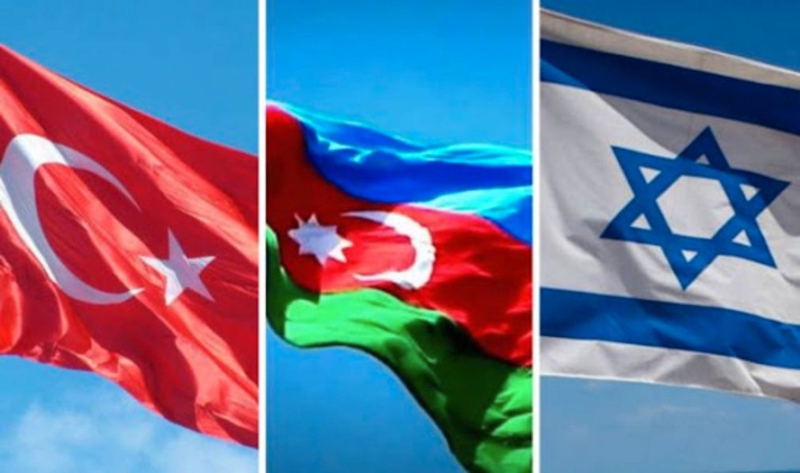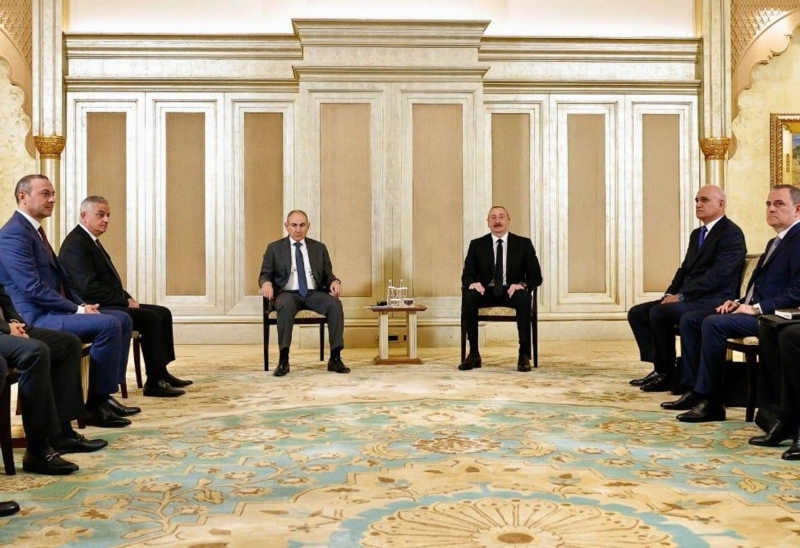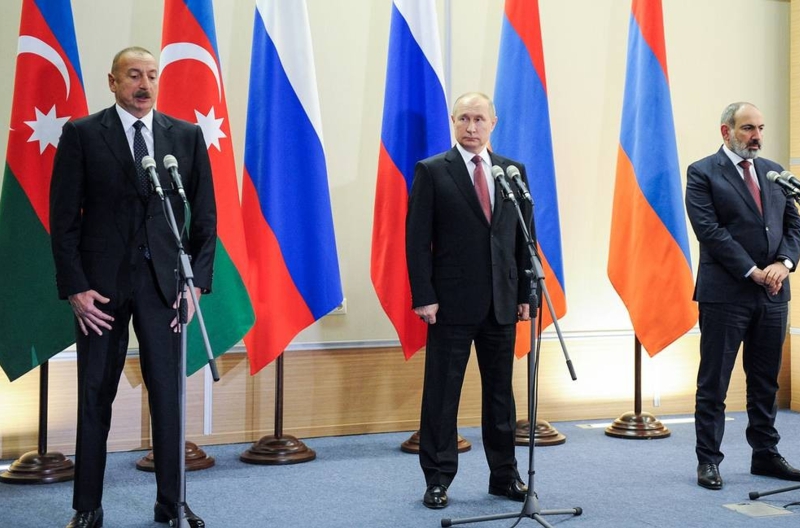On July 10, the leaders of Azerbaijan and Armenia held peace negotiations in Abu Dhabi. Worsening relations between Moscow and Baku and the recent arrests of pro-Russian opposition figures in Armenia may have given the talks a new impulse. As Armenia mends ties with Azerbaijan and Israel improves relations with Turkey, Russia’s influence in the South Caucasus continues to decline — to the advantage of the United States.
During a Russian law enforcement raid in Yekaterinburg on June 27, two Azerbaijani nationals were killed, three others were hospitalized in serious condition, and more than 50 people were arrested. The incident prompted a sharp, albeit non-lethal, response from Azerbaijan — the demonstrative arrests of Russian citizens in Baku.
The crisis between the two countries sparked widespread commentary, much of it focused on the role of the Azerbaijani diaspora in Russia and its alleged ties to organized crime. The episode was largely viewed through the prism of bilateral tensions or even as a clash between the ambitions of authoritarian leaders Ilham Aliyev and Vladimir Putin.
But the root of the conflict lies deeper than the Yekaterinburg violence or migrant issues. Since the 2020 Nagorno-Karabakh war, Azerbaijan has taken a pro-Russian stance, while Armenia has gradually leaned westward.
This divergence certainly affected the negotiation process: Armenia pushed for talks to be held in Europe or the United States, while Azerbaijan preferred Russian mediation. As a result, in-person meetings between Aliyev and Armenian Prime Minister Nikol Pashinyan were put on pause at the end of 2023, though diplomatic exchanges continued remotely, with both sides sending proposals and comments on the peace treaty text through official channels.
On March 13, 2025, Armenia and Azerbaijan announced they had completed negotiations and had agreed on a peace and intergovernmental relations treaty. Only the date and location of the signing remained to be decided. Armenia expressed its readiness to begin consultations with Azerbaijan on the matter.
Azerbaijan was aware of Russia’s disapproval of the deal. The treaty would not only bring an end to nearly 40 years of conflict, but also pave the way for normalization between Armenia and Turkey, a move that would inevitably undermine Russia’s influence in the South Caucasus.
In response, Azerbaijan set conditions for signing the peace agreement, the primary one being a demand for Yerevan to amend its constitution and remove references to the 1990 Declaration of Independence, which includes a call for the incorporation of Nagorno-Karabakh into Armenia.
The Armenian government replied that while it was open to constitutional changes, such amendments would require a national referendum, something only possible after new parliamentary elections in June 2026. Effectively, Azerbaijan’s demand meant delaying the agreement for 18 to 24 months, a timeline that suited Russia just fine. Turkey, however, was not willing to wait, stating that reopening borders and trade would open Armenia to Turkish influence. Such progress would strengthen Turkey’s position in the region — and thereby help in pushing Russia out.
Reopening borders and restarting direct trade wouldn’t only strengthen Turkey’s position in the region — it would also help in pushing Russia out.
Turkey’s growing role aligned fully with U.S. interests. While Ankara had experienced tensions with Washington in recent years, especially over its purchase of Russian air defense systems, things shifted dramatically in 2025. Much of that shift was driven by Donald Trump and his team, who were pursuing an ambitious regional plan aimed at reshaping the Middle East and South Caucasus in the name of Israeli security.
At its core, this plan was a continuation of Trump’s 2020–2021 Abraham Accords — agreements that normalized relations between Israel and Arab states including the UAE, Bahrain, Morocco, and Sudan. The updated goal was even more ambitious: the U.S. aimed to expand the accords not just to Arab countries like Syria and Lebanon, but also to non-Arab states including Armenia and Azerbaijan (potentially including Kazakhstan and Uzbekistan at a later stage).

As part of this effort, Washington sought to revive a strategic triangle among Turkey, Israel, and Azerbaijan. In recent years, ties between Turkey and Israel had sharply deteriorated due to the Palestinian issue and disagreements over Syria — to the point of a diplomatic break. But both countries play critical roles in U.S. Middle East policy, prompting the Trump team to pursue rapprochement. Azerbaijan, given its strategic relationships with both Turkey and Israel, was key to this vision. In February 2025, Hikmet Hajiyev, a top aide to President Aliyev, made a high-profile visit to Israel.
In March, following a meeting with Putin, Trump special envoy Steve Witkoff made an unannounced stop in Baku, where he held four hours of closed-door talks with Aliyev. It was later revealed that the agenda included Azerbaijan’s potential participation in the Abraham Accords, Israel-Turkey relations, and the peace process with Armenia.
This led to intense negotiations between the U.S. and Turkey, during which most bilateral disagreements were resolved. At the same time, Azerbaijan began mediating early contacts between Turkey and Israel. On May 8, confidential meetings were held in Baku between the heads of Turkish and Israeli security services. That same week, Aliyev canceled a planned trip to Moscow for the May 9 Victory Day parade.
Meanwhile, Turkey, in coordination with the U.S., ramped up efforts to finalize the Armenia-Azerbaijan peace deal. As recently as April, pro-government Azerbaijani media was floating the possibility of a renewed war, and Baku was officially issuing sharp warnings to Armenia. Turkey stepped in to prevent any further escalation.
Recep Tayyip Erdogan repeatedly urged Aliyev to move quickly and sign the treaty with Pashinyan, warning that any change in Armenia’s leadership could tilt the regional balance back in Russia’s favor. Erdogan also emphasized Armenia’s “Crossroads of Peace” initiative, promoted by Pashinyan since 2023, which aims to restore and utilize all transport routes through Armenian territory.
Aliyev did not oppose the idea but insisted that the first step should involve opening a transport route — the so-called Zangezur Corridor — linking Azerbaijan to its Nakhchivan exclave via southern Armenia. The issue then became one of Armenian sovereignty over cargo transit through its territory.
Even there, Pashinyan showed flexibility. In March, he published an article titled “On connection routes between Armenia and Azerbaijan,” proposing a reciprocal arrangement in which border control, customs, and other oversight functions at the Armenia-Azerbaijan border be delegated to a neutral third party, meaning a foreign company or organization.
Azerbaijan initially rejected the idea, but it gained traction inside the Trump administration. In May, the U.S. proposed a plan under which Armenia and Azerbaijan would hand over management of the transport routes to an American company. Notably, the plan made no mention of Russian involvement — a clear departure from proposals discussed after the 2020 war.
In May, the U.S. proposed a plan under which Armenia and Azerbaijan would hand over management of the transport routes to an American company.
At the same time, pressure was mounting on Aliyev to drop his insistence that the signing of the peace treaty be conditional on Armenia amending its Constitution. To resolve these and other sticking points, Aliyev and Pashinyan were urged to resume face-to-face talks. Finding a neutral location that wouldn't signal political weakness for either side was challenging, but the United Arab Emirates — a venue increasingly used by the U.S. for high-level diplomacy — met all of the necessary criteria. In essence, it would be a meeting on American ground.
The Kremlin was well aware of these developments and watched them with growing concern. Following the fall of Bashar al-Assad in Syria, Russia was all but pushed out of the Middle East, and the South Caucasus appeared to be next.
Unsurprisingly, Moscow made efforts at crisis management. On April 30, Sergei Kiriyenko, first deputy chief of staff to Vladimir Putin, was appointed as the Kremlin’s point man for Armenia. Russian media were told this move was made due to the Armenian leadership “drifting further toward the West, which is unacceptable from the perspective of Russian state policy.”
Sergei Kiriyenko, first deputy chief of staff to Vladimir Putin, was appointed as the Kremlin’s point man for Armenia in an attempt to save Moscow’s relations with Yerevan.
Pro-Russian forces in Armenia quickly mobilized, and tensions escalated throughout May. On June 18, Russian-Armenian billionaire Samvel Karapetyan, an opposition activist, was arrested after he allegedly called for the government’s overthrow. Then, on June 26, 14 more individuals, including outspoken government critic and protest leader Archbishop Bagrat Galstanyan of the Armenian Apostolic Church, were detained on charges of plotting a coup and seizing power.
Notably, this coincided with the June 27 raid by Russian security forces in Yekaterinburg, suggesting a coordinated Russian attempt to destabilize both Armenia and Azerbaijan — internally in Armenia, and externally in Azerbaijan via its large diaspora community. The firm response from Pashinyan in Yerevan and from Aliyev against Russia indicates that both leaders are receiving support and assurances from outside players, primarily the United States.

The most telling moment came on July 10, when direct talks between Aliyev and Pashinyan in Abu Dhabi took place with no Russian participation. According to both sides, the five-hour meeting was highly productive and included detailed discussions on the peace treaty and the future of Armenian-Azerbaijani relations. Another meeting is expected soon, potentially in the U.S. and possibly with President Trump in attendance. The formal signing of a peace agreement is anticipated to follow in the fall.
Moscow’s reaction to the Abu Dhabi meeting was also telling. Russian officials publicly welcomed the direct dialogue between the Azerbaijani and Armenian leaders, yet the Kremlin simultaneously resorted to one of its favored pressure tactics: the Federal Service for Veterinary and Phytosanitary Surveillance (Rosselkhoznadzor) suddenly announced it was imposing restrictions on imports of Azerbaijani and Armenian goods after finding “pests” in products from both countries.
This shows that both Armenia and Azerbaijan are likely to face heightened pressure and complications from Moscow in the coming months. This is especially true given that, unlike Azerbaijan, Russia still retains a wide range of tools to exert influence over Armenia, from the continued presence of a Russian military base in Gyumri to close economic ties.

